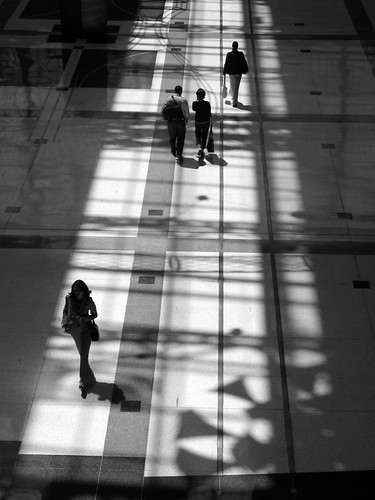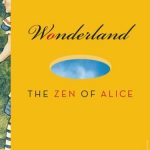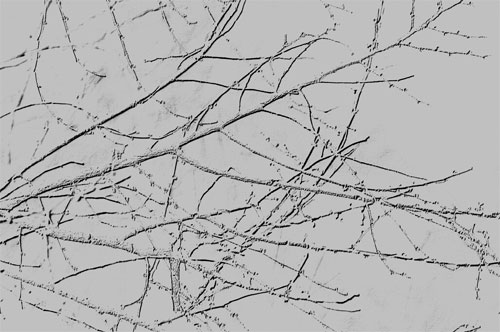
by Daniel Doen Silberberg | Oct 2, 2010 | Uncategorized, Zen

Imagine that there is a television screen and a large number of sneakers are scampering across it. The screen is crowded. That screen is our mind and the shoes are our endless thoughts. As we train and practice we can see the shoes slowing down. Sometimes, they slow down so much that we can see the screen itself.
Eventually the screen is what we see, rather than the shoes. The screen is really who we are. The shoes hide that.
Seeing the screen lets us cut loose from where we are stuck: all those familiar shoes. That translates into the ability to change both our actions and perceptions: to get unstuck. From that we develop the increasing ability to adapt to all kinds of circumstances.
This ability to adapt is the road to excellence and mastery. The Ancients called it The Way.
The fact that Darwin said adaptability is the key to survival and evolution is certainly no coincidence.
 photo credit: Ana_Cotta
photo credit: Ana_Cotta

by Daniel Doen Silberberg | Sep 23, 2010 | Uncategorized, Zen

In Journey to Ixtlan, by Carlos Castenada, Don Juan, his teacher tells him that you either make your self miserable or you make yourself strong, either way it takes about the same effort. I find that statement to be one of the most valuable teachings I have ever encountered. It has been running around in my head for more than thirty years. I hope it keeps on running.
Don Juan’s teachings have certainly informed my way of teaching and developing Lost Coin. I’ve made it part of our matrix – our ground and style- because it’s so direct, so inspiring it’s so no bullshit – true.
You either make yourself miserable or you make yourself strong. Our life, our death, our choice.
I just asked my students to join Second Life so we can have virtual meetings there at my home in Second Life. Its a great open-ended virtual world. (You can easily avoid the furry creatures who think you’re hot) Some will find my request odd, others won’t. I want it to be a kind of challenge.
You either close up and remain in what you know or you open up and embrace your changing world and life. Either way it takes about the same effort.
photo credit: scalespeeder

by Daniel Doen Silberberg | Sep 19, 2010 | Uncategorized, Zen

I have been reading a book by psychologist and trading coach Brett N. Steenbarger , The Daily Trading Coach. He asks:” Why would a trader seemingly desirous of success not sustain efforts to monitor her own thoughts, emotions,and/or trading performance? ” He paraphrases coach Bob Knight who answers with ……..” they are motivated to win, but not motivated to do the work it takes to become a winner. “
I find this an accurate description of a pitfall in the quest for self-knowledge or excellence. Throughout my training in Zen as well as in martial arts halls I saw myself and others became lost in the desire to “pass” koans and achieve a position or rank in the hierarchy. It is easy to forget that training is about who you are, not how you appear to others.
Lost Coin’s emphasis on excellence is about”being” excellent. It’s about self-mastery, self-discovery – not winning but “being” a winner.
 photo credit: kevindooley
photo credit: kevindooley

by Daniel Doen Silberberg | Sep 17, 2010 | Uncategorized, Zen

In my reading I come across so many people who thoughtlessly criticize video games as a waste of time. They’re often all too willing, beer in hand, to watch other people play games and don’t consider that time a waste at all.
Now let’s take a look at this: when you play a game yourself, either a video game, chess, monopoly, poker, scrabble, anything like that, you’re the one solving the problems. You’re the one using your mind. You’re the one focusing. You’re the one making the efforts.
That’s quite different from watching a game, unless you consider how to open a Bud a major problem solving event. Well after a few, it probably can be a major problem solving event.
Joking aside, the point is: games are a wonderful way to train for excellence.
Any professional training for performance involves simulation. Games are simulation. Games challenge you. Games develop your emotional and intellectual abilities.
It’s time we stopped old ways of thinking and embraced the new models.
So please, drop the Bud and pass me the game controller.
Games are experiential. They train you. Games and Zen have much in common.
 photo credit: nestor galina
photo credit: nestor galina

by Daniel Doen Silberberg | Sep 6, 2010 | Uncategorized, Zen

An excerpt from a recent talk at retreat in Upper Lake, California, August 2010
Dead tree. Blind donkey. Snow is magic, because it is not cold and wet. Nor is it a fortress for a snow fight. It is all of that. It is none of that. Nobody knows what snow is. The whole world is snow.

by admin | Aug 31, 2010 | Uncategorized, Zen

Here comes Shambala Publishing’s 2010 edition of Best Buddhist Writing with a selection from Doen’s Wonderland: The Zen of Alice!!!! He is in venerable company in this compilation: the Dalai Lama, Pema Chodron, Daido Roshi, Thich Nhat Hahn, amongst others. Congratulations Doen Sensei. It will be listed on our reading list on this website shortly, so please order it pre-publication here! Publication date is September 28, 2010.

by Elena James | Aug 25, 2010 | Uncategorized, Zen
Emerges through water
Reflecting the beauty within
New monks will blossom

This flower was hiding among the lilly pads in front of the zendo in Saratoga Springs. Inside the zendo was magical with a deepening sanga and insightful loving teacher.

by Daniel Doen Silberberg | Jul 26, 2010 | Uncategorized, Zen

I am walking my three month old pup Eyowyn, on a circular concrete path, around the old haunted hospital, toward the capitol. A smoky fog is rising up the avenues. It’s late February and Salt Lake’s winter is starting to give ground to signs of spring. I see the green tip of a Crocus that has broken the surface and a Robin, standing tall on a branch, now out of hiding. Plenty of snow can still fly but the temperatures are coming off their lows and the day’s end in lengthy sundowns.
From up above the narrow dirt roads of City Creek Canyon, I see the road that runs down from Capitol Hill between the San Francisco-like hills of the Marmalade District and through the Eagle Pass to the downtown. West, past the Capitol, the Oquirrh Mountains, still white, rear up from the flatness of the Salt Lake standing out towards Tooele which sits on its Western reach. The fog fades the lines of the mountains and the lake, fades the clarity, or is it the obscurity, of separation.
It has been a long winter. I get up each day at five a.m., huddle into my car and drive to the meditation hall, the Zendo. I cruise down Eleventh Avenue past the cemetery and a large mausoleum. Stars are still out and the mausoleum and its grounds lit by floodlights, claim center stage, overshadowing the early lights of the city. The car’s heater starts to cut the cold. Early morning runners dressed in bright colors emerge from the dark, under the Wasatch peaks.
Growing up in the Bronx, my father would speak to me about “where I was going with my life.” When I was 16 years old he instituted a reading program for me. For the duration of one hour each day I would be situated on a chair, covered in plastic slipcovers, in plain view. The syllabus consisted of sturdy classic literature with a leaning toward the elaborate Russian dramas. I spent allot of time remembering which character with a many syllabled Russian name had done what to another character with a frustratingly similar name – and so he shot his brother? – his mother? a third cousin thought to be lost in the Crimean War? But then I found some books of Zen Buddhist writing and my father, a sometimes-liberal thinker, approved them.
I read those old books in my over-heated room, cramped in bed, in my parent’s Bronx apartment. I found the Heart Sutra, or the Hsin Hsin Ming, D.T Suzuki, The Mumonkan Koans at my local library. In the dark, I’d follow their pointers, try their truths on. They said listen to the sermon outside my window, the preaching of the insentient – and I did. I let my mind fill the empty lots outside my window, the street full of cans and rubble, flattened cigarette packs, illegible pages of newspaper – the landscape of the Great Way.
A Monk asked Joshu “What is the way to the capitol (The great Way)?” Josh said “East, West, North, South.”
The houses around the haunted hospital are ornate, exclamatory, built, to last, like it or not. An easy, drizzling snow is falling. The weather’s been like this for a while. As I round the turn on Penny Parade I see the whole of Salt Lake City below me. The lines of the streets and lamps unclear in the fog, turned black grey and white – like a brush painting.
Eyowyn and I go around the side of our house and I open the gate to our yard. She takes off. Caryn and I live in a nice old spacious place. It’s rustic and imperfect. Caryn says it’s a dream she is enjoying having. The parching Utah sun is affirming that by crumbling the houses paint and wood. But now the decks and the yard are covered in snow, will soon yield flowers, cherries, vegetables and plums and then they won’t.
The house is set high up. A friend called it an Eagle’s nest. The magpies and scrub jays are eating the orange berries daily now. More proof of my spring coming theory but then my spring theories begin in January.
Up on the hills near the our house we’ve seen moose, deer, skunk and once a family of Foxes migrating through a tennis court where they often find food then return to their home in the cemetery.
*************
The way goes in and out of view. At times it goes right by my house and over towards the old haunted hospital then up towards the capitol. A lazy wet snow falls on it. Spring never comes. Walking on the Way to the Capitol is the family of old sages, rootless poets, the laughing Han Shans up on Cold mountain – the rivers, rocks and foxes who have abided in it, for all time, walking in place, complete in their realization.

![]() photo credit: Ana_Cotta
photo credit: Ana_Cotta






Recent Comments